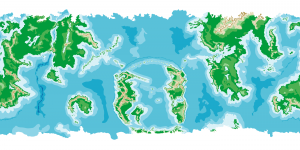Pacifica (Pacifica): Difference between revisions
>Qwert No edit summary |
No edit summary |
||
| Line 84: | Line 84: | ||
}} | }} | ||
| note = no--> | | note = no--> | ||
}} | }}'''Pacifica''' is the fourth planet from the Sun, situated in the [[Pacifica System (Pacifica)|Pacifica System]]. <!-- And that's it. This page is so empty... --> | ||
==Etymology<!-- Tin: I don't really have the knowledge for this but let's just start something and go into an editing war later. -->== | |||
The [[Austral language (Pacifica)|Modern Austral]] word ''Pacifica'' developed from Old Austral ''Pācificus,'' borrowed from Late Pretian <!-- Tin: A Latin-like language which is extinct but related, taken from the word barter (pretio). To signify the changes of land to ocean and ocean to land, between Pacifica and the outside where the language might be around. --> ''pāx'' (“peace, home”) ''+ -facio'' (“to make”)'', pāxifacio'' (“to make home”). It is used to refer to the feeling of home in certain dialects in Pretian.<!-- Skip Natural formation --> | |||
==Geophysical characteristics== | |||
===Size and shape=== | |||
Pacifica has a rounded shape with an average diameter of 12,742 kilometers (7,918 mi), making it the sixth largest planetary sized and the second largest terrestrial object of the Pacifica System. | |||
===Tectonic plates=== | |||
{{Main|Rynan model of tectonic plates}} | |||
Pacifica's mechanically rigid outer layer of Pacifica's crust and upper mantle, the lithosphere, is divided into tectonic plates. The ''xx'' major plates are ''xx''. <!-- Map here when applicable | |||
--> | |||
==Orbit and rotation<!-- Tin: I'm not sure how seasons work in Pacifica, is the axis tilted the other way? -->== | |||
Pacifica orbits the sun. | |||
==Pacifica–Min-Max system<!-- Tin: I really want to keep this name -->== | |||
===Maxima=== | |||
{{Main|Moon (Pacifica)}}Also known as the Moon, Maxima is one of two natural satellite of earth. | |||
===Minima=== | |||
{{Main|Minima (Pacifica)}}<!-- is the other one --> | |||
== Atmosphere == | |||
=== Weather and climate === | |||
{{Main|Sedunnic model of climate (Pacifica)}}Pacifica's atmosphere has no definite boundary, gradually becoming thinner and fading into outer space. <!-- Map here when applicable | |||
--> | |||
== Life on Pacifica == | |||
== Human geography == | |||
== Cultural and historical viewpoint == | |||
== See also == | |||
* [[Pacifica System (Pacifica)|Table of physical properties of planets in the Solar System]] | |||
[[category:Collaboration stubs (Pacifica)]] | [[category:Collaboration stubs (Pacifica)]] | ||
Revision as of 12:52, 9 May 2023
 Topographic map of Pacifica | |
| Designations | |
|---|---|
| Earth, Terra, Tellus | |
| Adjectives | Pacifican, eartly, terran, tellurian |
Pacifica is the fourth planet from the Sun, situated in the Pacifica System.
Etymology
The Modern Austral word Pacifica developed from Old Austral Pācificus, borrowed from Late Pretian pāx (“peace, home”) + -facio (“to make”), pāxifacio (“to make home”). It is used to refer to the feeling of home in certain dialects in Pretian.
Geophysical characteristics
Size and shape
Pacifica has a rounded shape with an average diameter of 12,742 kilometers (7,918 mi), making it the sixth largest planetary sized and the second largest terrestrial object of the Pacifica System.
Tectonic plates
Pacifica's mechanically rigid outer layer of Pacifica's crust and upper mantle, the lithosphere, is divided into tectonic plates. The xx major plates are xx.
Orbit and rotation
Pacifica orbits the sun.
Pacifica–Min-Max system
Maxima
Also known as the Moon, Maxima is one of two natural satellite of earth.
Minima
Atmosphere
Weather and climate
Pacifica's atmosphere has no definite boundary, gradually becoming thinner and fading into outer space.